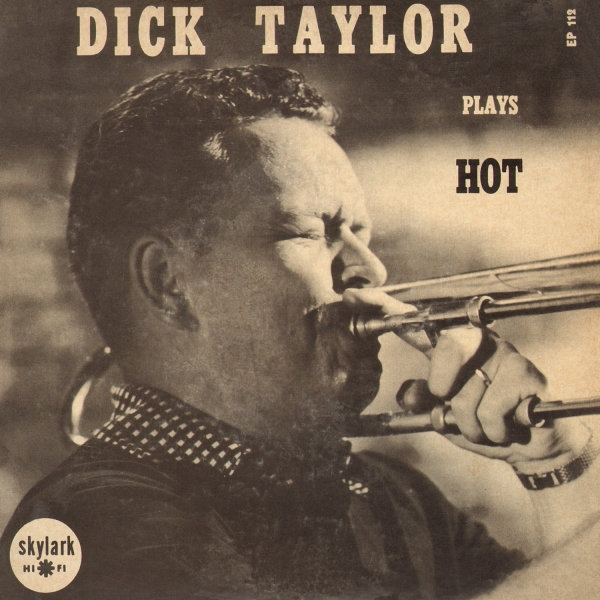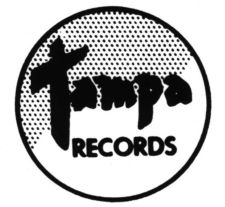| VSOP #131 |  |
|
V.S.O.P. #131 Skylark DICK TAYLOR: PLAYS HOT
This album consists of material that was released as Tampa 27 in 1957 or 1958 under the leadership of J. D. King. In actuality most of this LP comes from two 45 rpm EPs that were first released on Skylark Records as "Dick Taylor Plays Hot" EP 112 and EP 113, also released as Skylark 18 LP in October, 1954, then re-released on Tampa Records as J.D. King "Swingin' Saturday Nite Dance Party" with the addition of two tracks. Because Dick Taylor was such an important part of both Skylark Records and Tampa Records, when it began, we chose to release this material using the Dick Taylor cover and imprint.
Dick Taylor was a highly regarded trombone player who doubled on bass and whose recording career began with a Red Norvo V-Disc session in 1943. He spent most of his performing and recording career with Gene Krupa's outstanding late 1940's band which included Don Fagerquist, Red Rodney, Charlie Ventura, Teddy Napoleon, Buddy Stewart, the Triscaris, Al Porcino, etc. His playing career also included work with Louis Armstrong, Stan Kenton, Gerry Mulligan, The Lighthouse All Stars, Maxwell Davis and numerous other aggregations. He also was greatly in demand as a big band orchestrator, having arranged for Gene Krupa, Tony Pastor, Jerry Wald, Ray Noble and many others. As a trombone player, he was especially known for his tone, favorably compared to Jack Jenny's. He spent much of the early 1950's working with Robert Scherman, mainly as a contractor, but also as a recording artist.
Dick Taylor and Bob Scherman operated a demo recording business together called Webster Music, during parts of 1949 and 1950. They continued working together until 1956 or 1957. Many R&B and pop sessions for Tampa and Skylark were contracted and produced under Dick Taylor's name. He also was married to Vivien Gary for a short period of time and performed on her recordings for Skylark, after their breakup (at the time of her recordings for Skylark in March of 1952, she was married to Jimmy Giuffre, also on the date. Shelly Manne, who also was on this session, referred to it as "the recording date of Vivien Gary and her many husbands".).
J. D. King, under whose name this material was re-released on Tampa Records, was a big toned tenor man originally from Milwaukee, WI. He had joined the Andy Kirk band by 1943, and came out to Los Angeles at that time, and stayed. He appears with Andy Kirk (when Fats Navarro was with the band) on various dates as "J. D. King", as well as "James King". Later, he joined Teddy Edwards in Howard McGhee's group where the two provided some fiery bebop interplay on various recordings and live dates. He was featured on many other recordings, including a 1947 session under Vic Dickenson's name, a couple of sessions for Capitol featuring Alton Redd on vocals; and a Bumps Blackwell produced Sonny Knight session for Aladdin in 1953. After the sessions that make up this album and a few more for Tampa Records backing up vocal groups and other R&B vocalists, one session featuring J. D. King as leader with the Dick Taylor group was released on Aardell Records in 1956, (Aardell 0009, "Private Party", backed with "Hey Bridey Murphy). After that not much more is heard of J. D. King.
The complete program as released on Tampa under J.D. King's name was comprised of several different sessions. The six selections released on Skylark LP 18 (Skylark EP 112 and EP 113) were recorded in 1954. The AF of M logs for Skylark Records for 1954 indicate that the first took place on September 8, 1954 at Radio Recorders and included Dick Taylor on bass, J.D. King on tenor sax, Joe Felix on piano and Nick Fatool on drums. The 45 EP releases credit Paul Vallerina on drums, but on all copies that we have come across the name is crossed out by hand. A second Skylark session, according to the A. F. of M. logs, took place on December 21, 1954, and featured Dick Taylor on trombone , J. D. King on tenor sax, Jewel Grant on alto sax and possibly on drums, Bill Douglass on bass and Roger Fleming on piano. This session could not have contributed any material to the "Dick Taylor Plays Hot" releases since they were released prior to December, 1954.
The two tracks that were added on the Tampa J.D. King release, one featuring two saxophones and one featuring a quartet, could have come from this later Skylark date or from one of the various Dick Taylor led dates for Tampa Records in early 1955. To be sure, Tampa Records released a significant number of R& B singles from groups like the Saxons, The Flannels, Tony Allen, The Jac-O-Lacs, Mari Jones, etc., any one of which could have been the subject of one or more of the Dick Taylor/J.D. King sessions from Tampa . None of the Tampa Records sessions involve a quartet, although a quartet selection could have been recorded during any of the Tampa sessions.
The selections, presented here in the order that they appear on Tampa 27 "Swingin' Saturday Nite Dance Party", also released as "Hot Sax", begin with "Lover Come Back To Me" followed by "Blue Moon" Both selections are quartet numbers from September, 1954 showcasing J. D. King's playing and tonality. Teddy Edwards mentioned, many years later in an interview about the Howard McGhee band, that J. D. King was a real showman and had great presence on stage. Here we are treated to his big tone reminiscent of Coleman Hawkins. Dick Taylor is present on bass but not particularly featured. The next tune, a Dick Taylor original composition entitled "Two-Sixteen West Seven-O" includes Dick Taylor on trombone. Dick Taylor's trombone is featured and we are introduced to his rich tone, if only briefly, despite the fact that this is an up-tempo number. J. D. King takes a solo before the number is brought to a close, in surprisingly short order. The quartet is brought back for Don Redman's "Cherry", another feature for J. D. King, This is also performed up-tempo, which is somewhat unusual for this composition, which is also kept to a very short length.
The next selection is Dick Taylor's "Pretty Blues", a somewhat Ellingtonesque piece that is performed by the quintet. Both Dick Taylor and Joe Felix solo, before turning things over to J. D. King. A slow ballad with a tinge of the blues, this selection was half of the 45 rpm EP112.
The next selection is entitled "Big Deal", again performed by the quintet. This is mostly an arranged piece, of an obscure song by an obscure songwriter. It may have been the product of Dick Taylor and Bob Scherman's publisher demo business. Arnold Koppitch, who composed the song, was involved in a dispute between two publishers over a composition he had written back in 1949 which received quite a bit of press. He had signed the song over to two different publishers on the same day. The dispute was mediated by attorney John Shulman who was in part responsible for creating The Harry Fox Agency, Inc. This did not result in fame and fortune for Arnold Koppitch, but at least his name is not lost to us, and we get to hear his "Big Deal"...
The next two selections were never released on Skylark Records. "Boogie" is an apt title, since that is basically what it is. This is probably from a February 3, 1955 session which included Dick Taylor, J. D. King, Roger Fleming, Bumps Meyers, Floyd Turnham and Michael Tripp. This is a honking number, at least that is the style that is employed, although it is a rather tame one. The final selection "Hot Pepper" is a shuffling blues that features J. D. King in a quartet, with Dick Taylor on bass, Joe Felix or Roger Fleming on piano and either Nick Fatool or Bill Douglass on drums.
Neither Dick Taylor nor J. D. King are well known names today. Both transitioned from the swing era into bebop and post bop music in similar ways. Dick Taylor evolved with the Krupa band when it was at the zenith of its creativity, still playing in the harmonic and melodic style of the swing era but adapting to the more modern bebop vocabulary that had then become the norm. In this recording, much of his contribution is less noticeable as he fills the bass chair in the rhythm section. Still, when he solos on trombone, the richness of his tone is apparent.
J. D. King is also a throwback stylistically to the swing era, playing in a manner resembling Coleman Hawkins or Chu Berry. He begins his career in Los Angeles with a prominent swing band, Andy Kirk's, that like Krupa was modernizing, employing the likes of Fats Navarro and Howard McGhee. He later plays with Howard McGhee, well enough that he seems to have made a favorable impression on Teddy Edwards. After that, he seems to gravitate towards the blues and the big toned style that had been more fashionable in the 30's. This is what we hear mostly on these recordings, and represents a fairly good example of the basic music that Dick Taylor and J. D. King made for Skylark and for Tampa. Their music is often heard behind many of the R & B singers and vocal groups that appear on the various Tampa 45s. Because those recordings were more numerous than the eight selections presented here, the album cover for the Tampa 27 J. D. King "Swingin' Saturday Nite Dance Party" was used for the CD VSOP #88 West Coast Rock & Roll, which focused on Bob Scherman's rock & roll singles for Tampa and some of his other labels. |
 TAMPA RECORDS TAMPA RECORDSCHECK OUT OTHER TAMPA, SKYLARK OR INTERLUDE RELEASESContact Us V.S.O.P. RECORDS HOME/CATALOGYour Shopping Cart |

